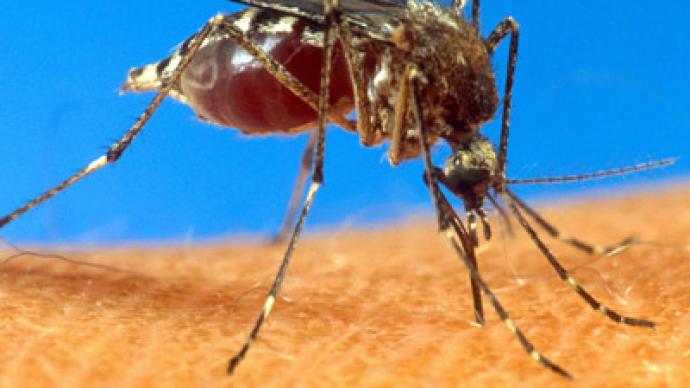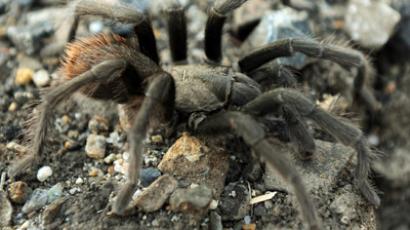GM mosquitoes: Risky experiment or life saver?

A team of scientists based in the UK has shown that genetically-modified mosquitoes could prove effective in eradicating mosquito-borne diseases such as malaria and dengue fever, but critics claim that the proposal is being rushed and is risky.
Oxitec, a British biotech company from nearby Oxford University, is leading the research and development in the fight against insect- transmitted disease. For now it’s focussing on dengue fever, which can lead to excruciating pain and death, but in the future the company hopes to help combat malaria as well.Scientists have created male mosquitoes which are genetically modified so that their offspring die before reproducing, or they themselves fail to find a mate. Scientists are in effect creating a sterile mosquito. However, as the CEO of Oxitec, Hadyn Parry, explains, they could not wipe out the aees aegypti species of mosquito, the one responsible for the spread of dengue fever, even if they wanted too. “It would be impossible to irradiate the species; it’s already in 110 countries. But we can try and tackle major dengue transmission areas,” he told RT.Scientists at Oxitec’s Oxford headquarters insist that there is no danger and no chance that the genetically-modified mosquitoes could cross mate with other species.
Risky business
But critics of the scheme are more cautious. The mosquitoes in the Oxitec project are genetically modified to need the antibiotic tetracycline to develop from larvae. Dr Helen Wallace of GeneWatch, an organization which monitors GM science, is concerned that if a mosquito bit the flesh of an animal that contained tetracycline, it could survive. This is a theory which the boffins at Oxitec reject. In their most recent trial in the Cayman Islands not a single mosquito survived. Even if they had done, they would have been so weak that they would have not have lived as long as their wild counterparts and would have been very susceptible to pesticide. Dr Wallace also claims that the scientific research has been rushed by Oxitec for financial reasons. “We have nothing against the technology in itself, but we think they are pushing ahead without doing proper risk assessment so that they can get a return on their capital investments,” she told RT.She added that if Oxitec do not implement this project carefully then there is even a risk of making dengue fever worse. She continued that much of their funding comes from the agricultural giant Syngenta, which has close links to other GM research. Dr Wallace believes the mosquito project is a PR campaign to help pave the way for other more lucrative agricultural projects such as genetically modified bees. Hadyn Parry is suspicious of Dr Wallace’s motives in her attacks on Oxitec. “GeneWatch is a one-member organization with Dr Wallace as its sole member. She throws the whole kitchen sink at us but she is neither a biologist nor an environmental scientist,” he said.
GM activism
Hadyn Parry admits that he faces a formidable opponent in the anti-GM science movement. “We’ve got a GM hangover because of GM crops. When they were introduced, there were a lot of activists that opposed it and we are tarred with the same brush. What we are trying to do is very different,” he said. Scientists at Oxitec insist that they have tried to test every possible problem that could arise from the release of their mosquitoes into the wild, but they admit that their biggest challenge is communication. “The main challenge is public perception, and that is a big challenge because we are a very small company and the anti-GM movement is very big and powerful,” Hadyn Parry continued.
Life saver
But with incidences of dengue fever rising all over the world, there are pressures for a solution. The World Health Organisation (WHO) estimates that there may be as many as 50 million cases of dengue fever each year and some 20,000 deaths, in what some countries are calling “explosive” outbreaks.It is also, as Hadyn Parry is quick to point out, mainly rich countries, particularly the US and the UK, which do not suffer from insect-borne diseases such as malaria and dengue fever, where you find most of the activists opposed to genetic modification. Dengue fever is spread by mosquitoes laying eggs in water near humans, including puddles or discarded drinks.Current methods of limiting the spread of dengue fever and malaria focus on education, such as using a mosquito net at night, as well as pesticides. Mosquitoes can develop immunity to pesticides and have begun feeding earlier in the day in response to the widespread use of nets. It is hoped that a combination of these more established techniques and the introduction of Oxitec’s genetically modified insects could, if not eradicate, then manage the incidence of mosquito-borne diseases much more effectively.After a successful trial Oxitec is now producing mosquitoes in Brazil. If a further trial goes well, they will apply for their first commercial licence, and the prospect of earning money for the first time in the company’s history. The technique has applications in agriculture as well as public health and is, according to Hadyn Parry, “potentially very lucrative,” but as he repeatedly stresses, “to do that we have to get the message across that it’s safe.”














